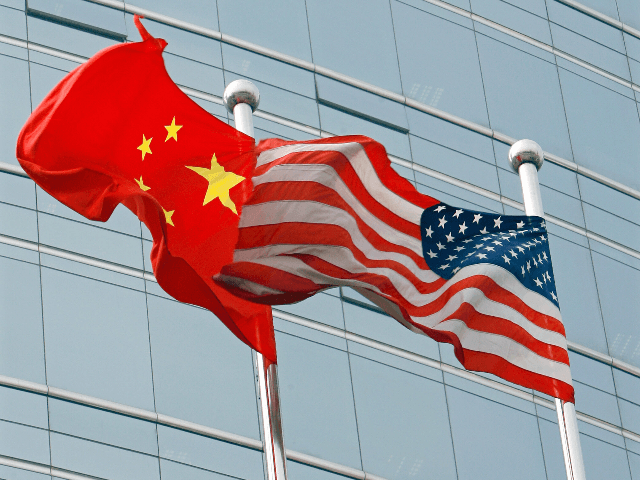America’s China policy has a clear division: Before Trump and After Trump.
Before President Trump, Washington slept while China stole our jobs, our technology and our future.
President Trump sounded the alarm and declared the days of economic surrender are over.
Americans have long understood communist China has been ripping us off.
Thanks to the President’s wake up call, a growing majority inside the Beltway acknowledges we must respond to the unrestricted warfare Beijing is waging against the United States of America.
Now Congress has the chance to back up their words with action and give our industries the ammunition they need to fight and win around the world.
That ammunition is found in the Export-Import Bank, and the House Financial Services committee must vote to reauthorize it on Tuesday.
President Trump wants it. Our negotiators on the front line in China’s trade war against the U.S. need it. And our farmers and our champion industries need it.
Ex-Im, as it’s commonly known, is the export credit agency of the U.S. government, facilitating the export of U.S. goods and services by providing American businesses with the financing necessary to compete for global sales.
Unlike most government undertakings, Ex-Im actually turns a profit, returning billions to the Treasury as exporters repay their loans.
Before Trump, ideologues on both the left and the right found reasons to eliminate this obscure but necessary agency.
Left-wing zealots called Ex-Im “corporate welfare” (never mind that no welfare program has ever returned money to the Treasury), making it the only welfare program Democrats ever opposed. Libertarian fundamentalists funded by the op-en borders Koch network called it “crony capitalism.”
After Trump, no one has any excuse to support unilateral disarmament while Red China deploys massive resources to take over world markets.
The United States and China are in a contest for global economic supremacy. The National Security Strategy of the United States explicitly identifies China’s economic challenge is a threat to our national security as well our opulence. 21st Century warfare is about economics.
To achieve its goal, the Chinese communist government is the world’s largest provider of export subsidies, and it is using them to outmaneuver the U.S. in Latin America, Africa, Asia and even Europe.
In 2009, it handed out over $174 billion in export subsidies to help its national champions win lucrative contracts. This “free money” allowed Chinese companies to beat out American companies in the competition to build dams, ports and other infrastructure projects around the world.
Due in no small part to Beijing’s rich export subsidies, seven of the top 10 global construction contractors are Chinese. Chinese contractors are now involved in over half of the hydropower projects in the world. Bye bye, Bechtel — Beijing just underbid you.
China uses export subsidies that take the form of low-interest financing to lock down natural resources in Africa and Latin America. China is expected to invest $1 trillion in Africa alone over the next decade.
Export subsidies enable the Chinese espionage-cum-telecom company Huawei to offer zero-interest financing on 5G internet infrastructure. Once China controls 5G information infrastructure, it controls everything.
The global economy is the battlefield in China’s bid for global dominance, and we must engage them with every resource at our disposal.
President Trump understands the crucial role of the Export-Import Bank in defending America’s national interest.
“It’s a very good thing and it actually makes money,” President Trump told the Wall Street Journal. “I was very much opposed to Ex-Im Bank, because I said what do we need that for IBM and for General Electric and all these — it turns out that, first of all lots of small companies will really be helped, the vendor companies, but also maybe more importantly, other countries give it. And when other countries give it, we lose a tremendous amount of business.”
In addition to China, some 85 other countries have export credit agencies to help their national champions win contracts – and jobs.
U.S. Trade Representative Robert Lighthizer – the point man in holding the line against communist China’s economic aggression – says the lack of a functioning Export-Import Bank “is having an impact and it is way beyond China and is costing us jobs and there is no excuse for it.”
Peter Navarro, the director of the White House office of trade and manufacturing and the architect of the administration’s tough trade policy put it bluntly: “The costs of keeping the Ex-Im Bank on the sidelines can be measured in the tens of billions of dollars of products we fail to export—and in the thousands of jobs we fail to create when this country does not have a fully functioning export credit agency to compete with its counterparts around the world.”
Congress needs to unite behind American farmers, ranchers, manufacturers and workers and reauthorize the Export-Import Bank.
Anything less amounts to unilateral disarmament in the face of China’s economic aggression.
Curtis Ellis is Policy Director with America First Policies. He was a senior policy advisor with the Donald J. Trump campaign.

COMMENTS
Please let us know if you're having issues with commenting.